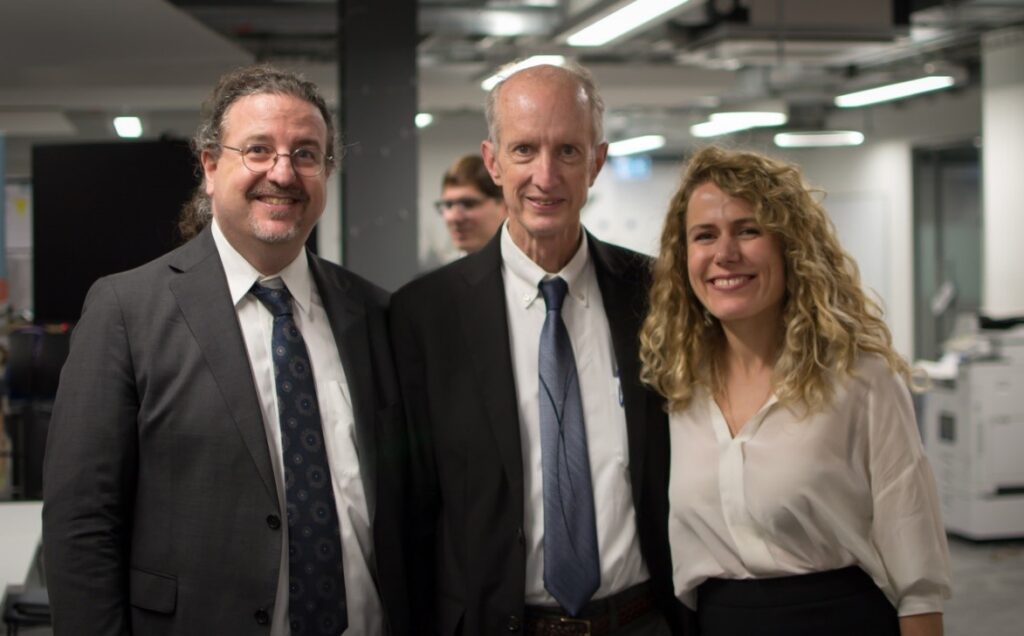Institute for International Management and Entrepreneurship hosted the launch of Global Production, National Institutions, and Skill Formation
On 3rd November, the Institute for International Management and Entrepreneurship (IIME) at Loughborough University London hosted the launch of Dr Merve Sancak’s book Global Production, National Institutions, and Skill Formation. The panelists included Professor Ben Ross Schneider (Ford International Professor of Political Science at Massachusetts Institute of Technology), Professor Christel Lane (Emeritus Professor of Economic Sociology at the University of Cambridge) and Professor Marius Busemeyer (Professor of Political Science at the University of Konstanz), leading scholars in the fields of comparative political economy of development, skill formation, and institutional analysis. Professor Gregory Jackson, who is a Professor of Comparative Management at the IIME, hosted the session.

Main arguments of the book
The book’s main argument is the state matters the most for skill systems, and higher state involvement in skill systems is more likely to lead to longer-term and inclusive development. This is elaborated through four sub-arguments:
- Governance structures in global automotive value chains shape firms’ skill needs but not the ways they address those needs: Price and quality are the main expectations of lead firms in global auto parts-automotive chains (AACs), which together affect suppliers’ skill needs. The price expectations push the firms to have a group of low-wage workers with flexible employment arrangements. The quality requirements lead to the employment of a group of (semi-)skilled workers.
- Firms in Turkey and Mexico have different practices to address their similar skill needs due to their different national institutions: In Turkey, firms employ students/trainees or recent graduates of public vocational education and training (VET) programmes until they leave to conduct their military service. These individuals re-join the labour market as workers with a VET certificate and some experience, and are employed as operators on a permanent basis. These operators can be promoted to higher level positions such as foreman, team leader, shift supervisor, even plant manager. In Mexico, firms have two distinct skilling strategies for the low-wage and (semi-)skilled posts. For the former, the individuals residing near the company are employed at a very low wage and are provided basic firm-level training. The content and length of the training varies significantly depending on firms’ size and location. For the (semi-)skilled posts, firms recruit those with post-secondary certificates. The possibility of low wage operators to move to higher posts is extremely limited.
- The state plays the major role shaping the national institutions: The state in both countries plays the key role in the public VET system, labour regulations including the minimum wage and contractual terms, firms’ location and accessibility to workers via cheap public transportation, and, for Turkey, the military service requirement, which constitute the key institutions for skill formation.
- Skill systems with higher state involvement may lead to longer-term and more inclusive development: The skill system with more state involvement in Turkey creates a higher possibility for class mobility due to the career development opportunities of operators while small-and-medium-sized firms can access skilled workers via public VET programmes. In contrast, operators’ career development is constrained in Mexico while firm-based training restricts the skill profile of smaller firms. The smaller firms’ access to skilled workers and operators’ career development opportunities can bring longer term and more inclusive development, although this aspect is not empirically examined in the book.

Discussants’ reflections
Professor Busemeyer, Professor Lane and Professor Schneider praised the book for its contributions to the understanding of skill formation particularly in late industrialising countries like Mexico and Turkey. The importance of the book’s multi-level approach was particularly emphasised, which involves firm-level research on employment and training practices, nation-level inquiry on institutions, and global-level study of governance structures of GVCs. The extensive fieldwork and rich empirical data drawn from interviews were shown as key strengths. The book’s theoretical contribution through linking two distinct fields of research that have remained apart, namely comparative capitalism and GVC governance, was particularly applauded.
In addition to their comments about the book’s contributions, the discussants pointed to some key issues the book raises, which may lead to further research and discussion. One common point mentioned by all discussants was the role of the state. The critics questioned whether the state’s importance is overemphasised, and whether other factors could be affecting the state’s involvement such as party politics, business politics or certain political leaders. Concerns about the links between state involvement and (un)democratic governments were also raised.
Dr Sancak explained that the institutions and infrastructure that enable high state involvement pre-date the current governments in the two countries. For instance, collective business associations’ involvement in VET is a key character that differentiates Mexico and Turkey. However, this is not merely due to businesses’ linkages with different political parties. The institutions for collective business activity are different in the two countries because of the distinct paths the states have taken during the liberalisation of their economies: while the chamber structure was maintained in Turkey, giving important economic and representational power to the umbrella organisation of business chambers, this structure was dismantled in Mexico after its joining to NAFTA. The governments in Turkey have been using this existing infrastructure for developing links with smaller firms and for managing the firms’ involvement in VET. The high state involvement may indeed come with democratic costs, Dr Sancak responded. The situation was also similar during the developmental states of Asian Tigers and the latest state capitalist development model in China.


The event attracted many participants in person and online including Loughborough students and staff, as well as those interested in the subject across the world.
Loughborough University London
Blogging everything that’s happening at Loughborough University London